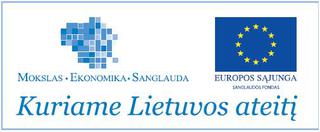BS/2, which is a member of the Penki kontinentai group, has successfully completed a two-year projected partly financed by EU Structural Funds called “HR development in the Private Limited Company “Penkiu kontinentu” bankines technologijos (BS/2) aiming to ensure the ability of employees to adjust to the needs of the company and changes in the labour market in the sphere of advanced information technologies”. (SFMIS number: VP1-1.1-SADM-01-K-01-158).
 BS/2, which is a member of the Penki kontinentai group, has successfully completed a two-year projected partly financed by EU Structural Funds called “HR development in the Private Limited Company “Penkiu kontinentu” bankines technologijos (BS/2) aiming to ensure the ability of employees to adjust to the needs of the company and changes in the labour market in the sphere of advanced information technologies”. (SFMIS number: VP1-1.1-SADM-01-K-01-158). The overall cost of the project was 760,000 LTL, of which about 230,000 LTL was contributed by the firm BS/2 itself as an investment in worker upgrading.
BS/2, which is a member of the Penki kontinentai group, has successfully completed a two-year projected partly financed by EU Structural Funds called “HR development in the Private Limited Company “Penkiu kontinentu” bankines technologijos (BS/2) aiming to ensure the ability of employees to adjust to the needs of the company and changes in the labour market in the sphere of advanced information technologies”. (SFMIS number: VP1-1.1-SADM-01-K-01-158). The overall cost of the project was 760,000 LTL, of which about 230,000 LTL was contributed by the firm BS/2 itself as an investment in worker upgrading.
Over the two years of implementation of the project from April 2009, sixty-two company employees have taken part in special training courses. The project’s training courses, which covered strategic management and sales, management of IT services by the ITIL method and the software creation process, served to improve the professional knowledge and skills of staff of almost all the units of the company. According to project coordinator Irmantė Zlatkutė, all the planned objectives of the project were successfully achieved, i.e. the professional qualifications of the firm’s sales and marketing managers and leaders and some other company employees was improved, as were the professional knowledge and skills of information system creation and support specialists. This raising of the skills level of the company’s employees through attendance at specially prepared training courses for the company’s managerial and technical personnel has created the possibility of improving the quality of BS/2 solutions and services and their added value for clients.
One of the training courses helped IT systems maintenance workers acquire specialised knowledge that was helpful in improving the quality of services offered by the company. When the IT service process analysis was completed and the company’s training courses were finished, BS/2 implemented the ITIL recommendations and accordingly received a certificate of compliance with ISO 20 000.
“Application of ITIL methodology makes possible a 54 percent increase in the productivity of IT personnel, a 49 percent reduction in the amount of time it takes to clear up incidents and up to a 31 percent improvement in worker productivity. In addition, down time in business units is reduced, which increases the firm’s competitiveness in the market and ensures client confidence”, said the Head of Marketing at BS/2, Ignė Tumaitė.
During the project, the newly acquired knowledge and skills increased the competence of the company’s workers, which, it is hoped, will help the firm in the future in striving to achieve a higher level of outsourced services for banks and will become the basis for working towards improvements in self-serve terminals, creation of software, security solutions, and outsourced services for retail banking industry.
I. Tumaitė says that the knowledge acquired by the employees has increased motivation and work effectiveness, which in turn has made it possible to expand activities even more successfully in the markets of Asian and Central and Eastern European countries, where BS/2 holds a strong leadership position. Furthermore, the company has already presented bank operations optimisation solutions, which were created by applying artificial intelligence technologies.
BS/2 provides systems integration and technical maintenance services in more than 65 countries of the world, it creates software for the banking sector, etc.
The BS/2 and EU project was partly financed by the European Social Fund under Priority 1 (“High-quality employment and social inclusion”) of its 2007–2013 Economic growth action program “Improvement of human resources in companies”.
